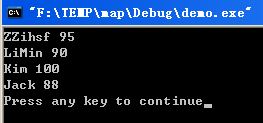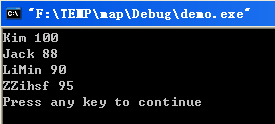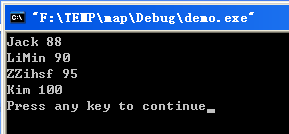STL容器(三)——对map排序
STL容器(三)——对map排序
对于map的排序问题,主要分为两部分:根据key排序;根据value排序。下面我们就分别说一下~
1. 根据key进行排序
map默认按照key进行升序排序,和输入的顺序无关。如果是int/double等数值型为key,那么就按照大小排列;如果是string类型,那么就按照字符串的字典序进行排列~(还记得之前说过的字典序吗?当时我们用到了next_permutation这个库函数!)下面我们展示一个例子,说明map中默认按照key升序排列的情况。
Example 1: 默认按照key升序排序
#include<iostream>
#include<string>
#include<algorithm>
#include<map>
using namespace std;
int main()
{
map<string, int> scoreMap;
map<string, int>::iterator iter;
scoreMap["LiMin"] = 90;
scoreMap["ZZihsf"] = 95;
scoreMap["Kim"] = 100;
scoreMap.insert(map<string, int>::value_type("Jack", 88));
for(iter=scoreMap.begin(); iter!=scoreMap.end(); iter++)
cout<<iter->first<<' '<<iter->second<<endl;
return 0;
}
上面结果表明,不过我们输入是怎样的顺序,map内部默认始终都是按照key升序排序的。
那么自然而然就会问到这样一个问题:我不按照升序排列不行吗?我可以修改map的默认排序方式吗?我可以自己设计排序规则吗?这些问题的答案都是必须的~!
首先透露给大家一个消息:我们在定义map类模板的时候不是只有两个参数吗~(map<string, int>)~~其实map一共有4个参数,后面省略的,或者说是默认的第三个参数就是关于排序规则的~~神奇吧!
具体而言,它有四个参数,其中我们比较熟悉的有两个: Key 和 Value。第四个是 Allocator,用来定义存储分配模型的,此处我们不作介绍。现在我们重点看下第三个参数: class Compare = less<Key>
这也是一个class类型的,而且提供了默认值 less<Key>。 less是stl里面的一个函数对象,那么什么是函数对象呢?所谓的函数对象:即调用操作符的类,其对象常称为函数对象(function object),它们是行为类似函数的对象。表现出一个函数的特征,就是通过“对象名+(参数列表)”的方式使用一个 类,其实质是对operator()操作符的重载。现在我们来看一下less的实现:
template <class T> struct less : binary_function <T,T,bool>
{
bool operator() (const T& x, const T& y) const
{return x<y;}
};
注意,这些都是它内部的内容,我们无需要自己编写!上面默认的是less,那么还有几种是可以供我们自由选择的,而且这些都不需要自己写函数对象,直接在定义map的时候,指明对第三个参数即可~
有个需要注意的,在指定compare类型的时候,需要加入key的类型作为参数!例如:greater<string>。
Example 2: 按照key降序排序
#include<iostream>
#include<string>
#include<algorithm>
#include<map>
using namespace std;
int main()
{
//注意这里的greater<string>,其有个参数就是key的类型,比如这里就是string
map<string, int, greater<string> > scoreMap;
map<string, int, greater<string> >::iterator iter;
scoreMap["LiMin"] = 90;
scoreMap["ZZihsf"] = 95;
scoreMap["Kim"] = 100;
scoreMap.insert(map<string, int>::value_type("Jack", 88));
for(iter=scoreMap.begin(); iter!=scoreMap.end(); iter++)
cout<<iter->first<<' '<<iter->second<<endl;
return 0;
}
当然,默认的compare参数还有这样的几种:equal_to 相等;not_equal_to 不相等;less 小于;greater 大于;less_equal 小于等于;greater_equal 大于等于。不过其余的几种貌似不太用的到啊~
那么怎么样自定义compare呢?这个就需要我们自己写一个函数对象了。如下:
Example 3: 自定义比较规则
我们可以自定义一个按照key中的string长度排序,程序如下:
#include<iostream>
#include<string>
#include<algorithm>
#include<map>
using namespace std;
struct cmp //自定义比较规则
{
bool operator() (const string& str1, const string& str2)
{
return str1.length() < str2.length();
}
};
int main()
{
map<string, int, cmp > scoreMap; //这边调用cmp
map<string, int, cmp >::iterator iter;
scoreMap["LiMin"] = 90;
scoreMap["ZZihsf"] = 95;
scoreMap["Kim"] = 100;
scoreMap.insert(map<string, int>::value_type("Jack", 88));
for(iter=scoreMap.begin(); iter!=scoreMap.end(); iter++)
cout<<iter->first<<' '<<iter->second<<endl;
return 0;
}
按照这个示例,我们还可以设计其他的比较规则,把比较规则写在cmp结构中,然后在定义map的时候调用即可~
2. 根据value排序
其实更多的时候,我们需要对value进行排序,比如对学生成绩这个map进行排序的时候,我们不大可能需要名字排序,却很有可能需要按照分数进行排序。那么问题来了,我们是否可以按照上面那样子,简单的指明一个参数,或者自定义一个比较规则cmp即可呢?答案是失望的,map模板里面没有这个性能。。。
究其原因,map是个关联容器,不是序列容器。像是一些序列容器list, vector都是可以排序的~咦,我们可不可以把map中的<key, value>对放在一个vector中呢?那样是否就可以直接用vetor的sort函数呢?这个想法不错~
下面我们来详细说一下这个想法:
首先,map中的<key, value>是pair形式的,那么我们就可以把一个pair作为vector中的元素;
然后,调用vetor容器中的sort函数,sort函数也是可以用户指定比较类型的。
template <class RandomAccessIterator> void sort ( RandomAccessIterator first, RandomAccessIterator last ); template <class RandomAccessIterator, class Compare> void sort ( RandomAccessIterator first, RandomAccessIterator last, Compare comp );
程序如下:
#include<iostream>
#include<string>
#include<algorithm>
#include<map>
#include<vector>
using namespace std;
typedef pair<string, int> PAIR;
struct cmp //自定义比较规则
{
bool operator() (const PAIR& P1, const PAIR& P2) //注意是PAIR类型,需要.firt和.second。这个和map类似
{
return P1.second < P2.second;
}
};
int main()
{
map<string, int> scoreMap; //这边调用cmp
map<string, int>::iterator iter;
scoreMap["LiMin"] = 90;
scoreMap["ZZihsf"] = 95;
scoreMap["Kim"] = 100;
scoreMap.insert(map<string, int>::value_type("Jack", 88));
vector<PAIR>scoreVector;
for(iter=scoreMap.begin(); iter!=scoreMap.end();iter++) //这边本来是使用vector直接初始化的,当时由于vc 6.0 编译器问题,只能这样写,而且还有非法内存。。
scoreVector.push_back(*iter);
//转化为PAIR的vector
sort(scoreVector.begin(), scoreVector.end(), cmp()); //需要指定cmp
for(int i=0; i<=scoreVector.size(); i++) //也要按照vector的形式输出
cout<< scoreVector[i].first<<' '<<scoreVector[i].second <<endl;
/*
for(iter=scoreMap.begin(); iter!=scoreMap.end(); iter++)
cout<<iter->first<<' '<<iter->second<<endl;
*/
return 0;
}
这样我们就把map的排序:按照key排序;按照value排序都说好了~



